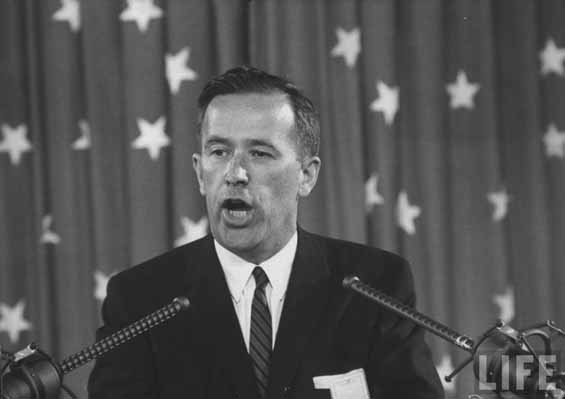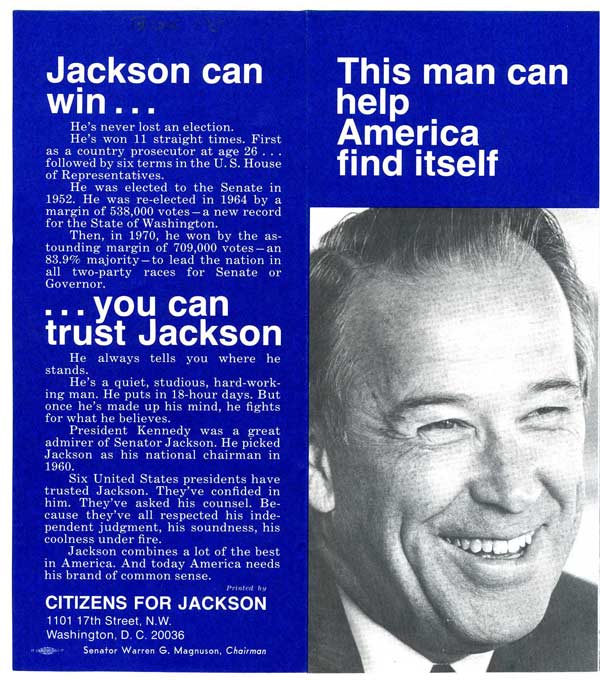"It is time for a New Deal for America. It is time for a new approach to foreign policy, it is time to stand up to the Soviet Union and regain America's status in the world. America needs to be great again, we need to stand up and fight for our values. We need to fix our economy, we need to reverse the tides of decline. The inflation, the unemployment, the recession, we have to defeat them. America's best days are not behind it but still ahead of it. The decline will end, and it will be morning in America again. It will be a day where we can be proud of our country again, trust our government, be a nation respected and strong across the world and with an economy that is prosperous and will deliver for all. That is what I intend to do as your President."-The President-Elect makes his inaugural address, January 20, 1977
 The Democratic race was muddled for most of 1975. Polls showed Jackson in the lead, but then George Wallace was in the lead, and Ted Kennedy led those he was included in. When Humphrey was included he led the polls. Notably, many of the people leading the polls were not actual candidates. However of the actual candidates, most would have wanted to be in Jackson's shoes. He had a strong constituency and support in the party. As 1975 continued Jackson railed against the Ford administration's START treaty, and Saigon fell, ending the Vietnam War with a national humiliation. Influential in the Senate, he was taking a stand against the Soviets, against Gerald Ford and for his agenda and campaign. Angering the left with his hawkish rhetoric, Jackson showed no intention of catering to them for his bid. He would win as Scoop Jackson, or lose as Scoop Jackson, that much was clear.
The Democratic race was muddled for most of 1975. Polls showed Jackson in the lead, but then George Wallace was in the lead, and Ted Kennedy led those he was included in. When Humphrey was included he led the polls. Notably, many of the people leading the polls were not actual candidates. However of the actual candidates, most would have wanted to be in Jackson's shoes. He had a strong constituency and support in the party. As 1975 continued Jackson railed against the Ford administration's START treaty, and Saigon fell, ending the Vietnam War with a national humiliation. Influential in the Senate, he was taking a stand against the Soviets, against Gerald Ford and for his agenda and campaign. Angering the left with his hawkish rhetoric, Jackson showed no intention of catering to them for his bid. He would win as Scoop Jackson, or lose as Scoop Jackson, that much was clear.

_____________________________________________
[1]This is the first PoD. Without Humphrey running labor shifts its full support to Jackson, rather than giving only lukewarm support to him in the futile hope Humphrey will run.
This is my new TL, detailing an alternate 1976 US election and after-effects of a different President in the late 1970s and the flow-on effects from there. I'll detail the Republican race in the next update. Hope you like it!
HUBERT HUMPHREY ANNOUNCES "I WILL NOT RUN, I WILL NOT SERVE"-JANUARY 30, 1975 [1]
REAGAN ATTACKS FORD, CALLS FOR CONSERVATIVE LEADERSHIP, HAWKISH FOREIGN POLICY-FEBRUARY 3, 1975
Henry Martin 'Scoop' Jackson announced in February 1975 that he was running for President. Jackson attracted strong support from the Jewish community and labor, and the party establishment moved towards him, though it held out for a Ted Kennedy run. Jackson was a frontrunner in the race, with a strong early position in the race. He ran on social issues, running a law and order campaign and opposing busing. Jackson saw a path to victory for himself based off Nixon's 'Silent Majority'. Jackson's support for Vietnam hurt him with the party base, and speculation was that he was out of place in the change environment of 1976. He thought differently. Gerald Ford was failing, and Ronald Reagan was a flawed candidate too. He could craft a path to victory in 1976. A Jackson constituency did exist, he just had to seize it. And so the presidential campaign of Scoop Jackson began.REAGAN ATTACKS FORD, CALLS FOR CONSERVATIVE LEADERSHIP, HAWKISH FOREIGN POLICY-FEBRUARY 3, 1975


[1]This is the first PoD. Without Humphrey running labor shifts its full support to Jackson, rather than giving only lukewarm support to him in the futile hope Humphrey will run.
This is my new TL, detailing an alternate 1976 US election and after-effects of a different President in the late 1970s and the flow-on effects from there. I'll detail the Republican race in the next update. Hope you like it!
Last edited:


